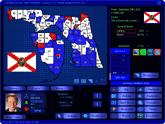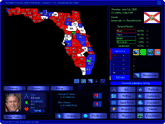The desire of incumbant Democratic governor Christine Gregoire to run for re-election, as well for her Republican rival, Dino Rossi, from 2004, who lost by 129 votes in a third manual count, to once again challenge her, leads to a dominant theme in this election. But can other challengers from the two main parties, and even Third Party and non-partisan candidates, make an impact this election? Or will it retread (or reverse) 2004’s path?
Author: Patine





